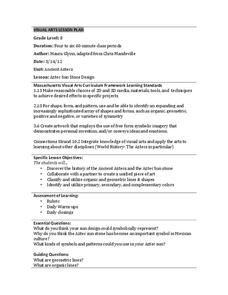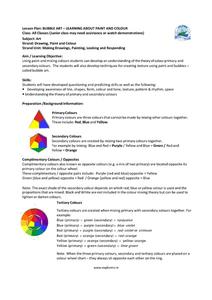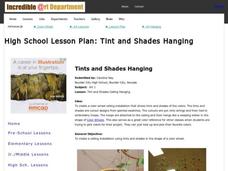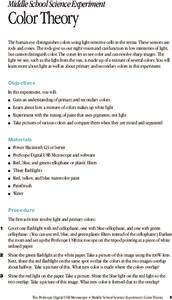Curated OER
Ancient Aztecs
Is it a calendar? A religious symbol? A political statement? One thing for certain is that Aztec sun stone designs remain an important symbol in Mexican cultural art. Young artists craft their own Aztec Sun design incorporating ideas...
Urbana School District
Light
You matter, unless you multiply yourself by the speed of light ... then you energy. Presentation covers the behavior of light as both a wave and a particle, light versus sound, space travel, why objects have colors, depth perception,...
Museum of Tolerance
Music Evokes Memories and Emotions
Dim the lights, take a deep breath, and press play to explore the emotions and memories that music elicits. Class members begin using relaxation techniques designed to create a positive listening experience. As music plays, learners...
Marine Institute
Bubble Art – Learning About Paint and Color
To gain an understanding of color mixing theory and the color wheel, young artists draw a picture, mix up a batch of secondary colors to which they add dish soap, and using straws, bubble up the paint....
Positively Autism
Primary and Secondary Color Worksheets
Here's a worksheet formulated for fun. Kids add two primary colors to produce a secondary color and record the results on train-themed worksheet.
Arts Ed Washington
Art Lessons in the Classroom: Our Family
Blend art and family into one lesson with an activity involving oil pastels and watercolors. After viewing a few famous portraits of families, learners create masterpieces that represent their own families.
K-5 Math Teaching Resources
Mini Math Word Wall
Provide a little extra support for your emerging mathematicians with a personal word wall. Including graphics and images that support children with learning to count, identify colors and shapes, and read high frequency words,...
National Gallery of Canada
My Treehouse
If you could build your own treehouse, what would it look like? Using a piece of contemporary art as inspiration, learners draw their own treehouses and add geometric and organic shapes. The instructional activity touches on Visual...
Art Institute of Chicago
Color Combinations
Explore color through an examination of pointillism and light. Class members view Georges Seraut's famous painting on a computer, zooming in and out to see the details and effects of the technique. They then cover how light and color are...
Incredible Art
Tints and Shades Hanging
Here's a mobile assignment that will brighten up your classroom. Each group is assigned one color from the color wheel, paints the pure color, three tints, and three shades of that color on precut forms the group designs, and hangs the...
Curated OER
Complementary Superheroes
Students discover the color wheel. In this color lesson, students find the primary colors, secondary colors, and contrasting colors. They look through the designs of super hero logos and create their own using what they know about...
Curated OER
Shaping the Color Wheel
When you paint you almost always use color. Budding artists explore the color wheel, color vocabulary, and painting techniques. They discuss and practice mixing colors, then paint a color wheel for personal reference.
Curated OER
Color the Snow
Are your teaching in a cold and snowy environment? If so, then try out this fun activity with your class. You mix a variety of colors in large jars to show learners the difference between primary and secondary colors, then let them mix...
Curated OER
Painting a Color Wheel
You have to love the color wheel, it's just so colorful! Your kids will love it too, as they work through an introductory exercise which allows them the opportunity to draw and paint a color wheel of their own. This wheel focuses on...
Curated OER
Colors, Colors Everywhere
Students mix red, yellow, and blue frosting together to produce secondary colors. Pupils are shown that all colors are made from mixing primary colors of paint together. They discuss the color wheel and spread the "paint" icing on...
Curated OER
Color Theory
Students are able to gain an understanding of primary and secondary colors. They are able to explore about how a mixture of colors makes up white light. Students are able to experiment with the mixing of paint that uses pigments, not...
Mr. E. Science
Light
Where does bad light end up? In a prism! The presentation covers light, mirrors, lenses, and the structure of the eye. It also provides explanations of reflection, refraction, concave and convex mirrors and lenses, and a comparison of...
Oglebay Institute
Post-Impressionism: Pointillism
How can little dots in two colors make a third color? Experiment with pointillism and color mixing with a series of activities. After viewing paintings by Seurat and watching a teacher demonstration, pupils create samples of three...
Curated OER
The Purple Cow
Students read and discuss the poem, The Purple Cow. In this poetry lesson, students discuss the rhyming words in the poem and why this piece of literature is silly or unusual.
Curated OER
Mixing Colors with Corn Syrup and Food Coloring
Anyone who has worked with small children know that color identification and color mixing can be fun! This simple idea has a lot of potential. It suggests to mix food coloring with corn syrup to provide an opportunity for color mixing...
Curated OER
The Color Wheel
Hand out this nifty resource to make your next lesson on the color wheel a snap. It is a picture of the color wheel alongside a description of primary, secondary, and mixing colors. Great for artists of any age.
Curated OER
Counting Coloring Puzzle
If your kids enjoy color-by-number, they will be excited about this worksheet! Using a color key, they match numbers on a picture of a bee by coloring them the corresponding shade. There is a trick here: although the number 10 is listed...
Curated OER
Color Theory
Sixth graders explore the basics of color mixing with paint by creating secondary and tertiary colors. Individually, 6th graders create their own paintings based on a popular series of sculptures.
Curated OER
Do You Know Your Colors?
Red, yellow, green, and blue are such wonderful colors. Introduce your littlest learners to the color names, where they are commonly found, and how they can be mixed or made. A highly visual presentation that shows its colors.

























